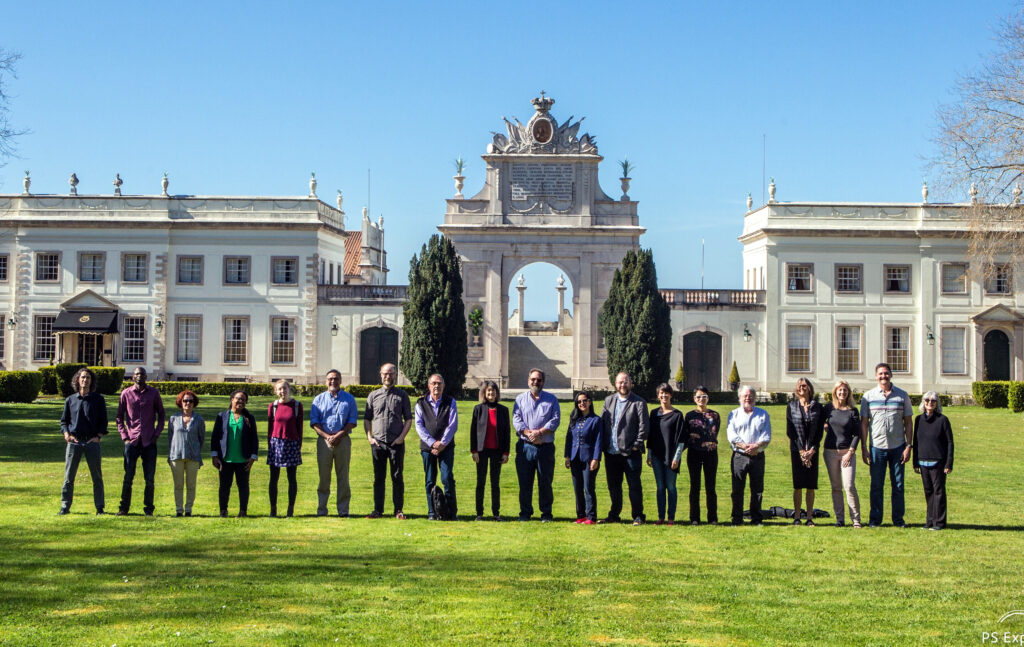Toward an Anthropological Understanding of Masculinities, Maleness, and Violence
Date
Mar 15-21, 2019Organized by
Agustin Fuentes, Matthew Gutmann and Robin NelsonLocation
Tivoli Pálacio de Seteais, Sintra, PortugalPublications
Current Anthropology, Vol. 62, S23, February 2021.Participants
- Pratiksha Baxi Jawaharlal Nehru University, India
- Richard G. Bribiescas Yale University, USA
- Sealing Cheng Chinese University of Hong Kong, Hong Kong
- Lise Eliot Rosalind Franklin University of Medicine and Science, USA
- R. Brian Ferguson Rutgers University, USA
- Agustin Fuentes University of Notre Dame, USA
- Matthew Gutmann Brown University, USA
- Godfrey Maringira University of the Western Cape, South Africa
- Hannah Marshall University of Cambridge, UK
- Debra L. Martin University of Nevada Las Vegas, USA
- Sally Engle Merry New York University, USA
- Robin Nelson Santa Clara University, USA
- Mark Padilla Florida International University, USA
- Bob Pease Deakin University, Australia
- Rick W.A. Smith Dartmouth College, USA
- Tiffiny Tung Vanderbilt University, USA
- Maria-Amelia Viteri University of Maryland/USFQ
ORGANIZER’S STATEMENT: No one is surprised that most murderers are men. What gets ignored too often is that most men are not murderers. However, the entanglement between maleness, masculinity, and violence is neither straightforward nor uniform. For several decades, cultural anthropologists have studied and analyzed masculinities and gender-based violence of all sorts. These range from intimate partner violence, rape and other forms of sexual abuse, racialized violence, and armed conflict. Simultaneously, biological anthropologists have examined the relationships of evolutionary processes, genomics, and endocrinology between maleness and violence. Yet rarely if ever do these two currents in contemporary anthropological scholarship meet, except perhaps in effortless dismissal of the more intemperate claims of others.
In humans, imagination, perceptions, and ideology matter as much as bone, muscle, and Y chromosomes. Both perceptual and material feedback loops channel violence into physiological changes in bodies and reshape ideologies. Yet outside and inside the academy there is widespread confidence in biological explanations that draw a direct link between maleness and violence. What we seek here is a more nuanced approach that recognizes previous engagements but gives weight to imagination, perceptions, histories, and embodiment in masculinity and violence. A central purpose of this symposium is for scholars from diverse branches of anthropology and allied fields to engage in dialogue, to not talk past each other, to sincerely seek better toolkits to address issues of violence, masculinity, maleness within our academic and public discussions, communications, and debates.
Donald Trump’s boasts of sexual assault, the counter-wave of women’s protests against male predatory entitlement and impunity, and the challenge to men to cease their complicity have become pivotal on every newscast featuring sexual harassment and assaults. Our own field of anthropology has become a central locale for uncovering, engaging and dealing with male privilege, bias and coercive violence. The topic of violence is obviously expansive. For this symposium, we want to focus discussion on physical and psychological violence associated with maleness and masculinities from coercion to warfare. These topics should remain a focus of our attention for years to come, and anthropologists should have more authority to speak to the fundamental questions: Is this just the way men are if they think they can get away with it? Is male violence “natural”? In examining beliefs about men’s aggressive natures rooted in some imagined prehistory, an accurate understanding of biology in integration with a broader anthropology has never been more important. We think that diverse anthropological theory must be brought to bear on this subject if we are to develop more complete, effective and usable (in policy, education, and public debate) analyses of maleness, masculinities, and violence.
In the late twentieth and early twenty-first centuries the spate of learned reports on aggression might make one think that there is a causal link between maleness and violence. Selfish genes, demonic males, the spread of agriculture, personal vengeance, and politics by other means have all been ideas promoted to explain the innate violent connection between maleness and power. But is any of it true?
The eminent Cambridge neuroscientist Joe Herbert, writing in 2015, tells us, “As well as the imprint of biological inheritance, we see the tendrils of testosterone all over war, gangs, and fanaticism,” and, “There’s a very simple reason why most financial traders are young(ish) men. The nature of trading incorporates all the features for which young males are biologically adapted.” Do the on-average differences between male and female physiologies form the underlying basis for violence? Perhaps not, but if they do indicate something, what can we learn from them?
This conference will gather some of the leading researchers on maleness, masculinities, and violence in anthropology to engage each other in constructive dialogue on these issues. If anthropology is to mean anything as an integrative discipline, it must be able to advance our understanding by bringing the subfields into the direct exchange of ideas on pressing social challenges like gender-based violence.
We are not looking to repeat past assessments of this topic. Nor are we looking to remain segregated by different vantage points, ideologies and methodologies. We seek to disregard traditional boundaries and ask all who participate in this conference to come prepared to absorb a full range of ideas, to attempt to identify and facilitate connectivities across approaches.
Current Anthropology supplement on the UCP website
Wenner-Gren Symposium #159
